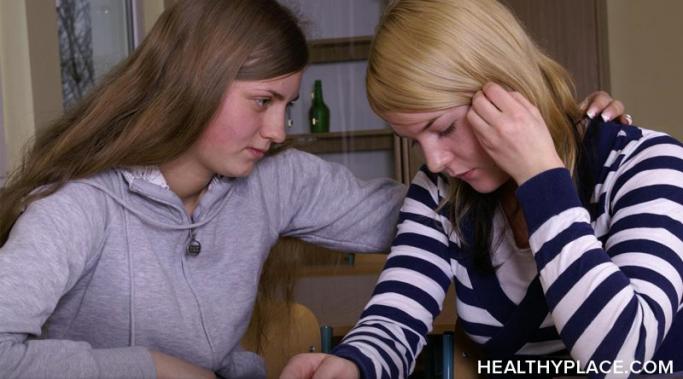Blogs
The #MeToo hashtag campaign exposed sexual violence (including sexual harassment and rape) as a significant event in the lives of most women. One of the most common forms of this violence is sexual harassment. A few examples of sexual harassment are catcalling, suggestive comments at school or work, and unwanted sexual advances. Many women have experienced at least one instance of everyday sexual harassment, and one in five has experienced a major act of sexual violence, like rape.
Eating disorder recovery is filled with realizations; some are happy finds and some are painful ones. But we need both types of realizations to accept our imperfection and move forward in it. For over a year now, I’ve been committed to writing the Surviving ED blog for this community. I’ve loved it and it’s time for me to say goodbye. But I'm not leaving without passing on a firecracker of my most stunning realizations in eating disorder recovery.
Withholding contact is something your partner could do that could make you feel worse than hearing his verbal abuse. Picture yourself in a relationship in which there are no violent outbursts, no explosive fits of rage, no words thrown at you like hand grenades, in which your only punishments are silence and deprivation. It may sound like a favorable option to anyone on the frontline of a verbally abusive relationship, but so-called "withholding" is a particularly insidious method of abuse that deprives us of our basic comforts and makes us feel less than human. Here's why verbal abusers withhold verbal and physical contact, and how to respond.
Learning verbal abuse coping skills is more important than you might think. Common misconceptions about verbally abusive relationships are that verbal abuse is solely characteristic of romantic relationships and that you can simply leave. Verbal abuse can be present in relationships involving parent and child, siblings, friends, romantic relationships, co-workers, school-yard bullies -- the list continues. Considering people cannot immediately leave their family, quit their job, or change schools, it can be life-changing to develop verbal abuse coping strategies such as learning the facts about verbal abuse, response techniques, and ways to love yourself amidst the verbal abuse.
People often advise others to “just leave” and while this advice likely comes from a place of love, it may not be realistic. With that being said, verbal abuse does not have to plague your life. If you can escape, do so promptly. Your future self will thank you. These verbal abuse coping skills and tips are for relationships that you cannot readily exit and should be helpful until you’re able to remove yourself from the situation entirely.
How much alone time is healthy for me? I used to ask that question multiple times a day when I was recovering from mental illness. Sometimes I felt like I was spending too much time alone and other times I felt like I wasn’t spending enough time alone. People who aren’t suffering from a mental illness may ask themselves this too, but in the case of mental illness recovery, I feel it is more of a tricky one: Isolation and loneliness harms mental health recovery, but taking no time for yourself isn't good for you either. How much alone time is healthy when in recovery from mental illness? A black-and-white answer doesn’t exist.
A certified peer support specialist is a person in mental health or addiction recovery that uses his or her personal experiences to connect with and help others. I work for a community mental health agency where I provide emotional support and knowledge of resources to others in recovery. Being a certified peer support specialist allows me to give back to my community.
My name is Alexander Crawford, and I’m the new author of Creative Schizophrenia. I was diagnosed with schizoaffective disorder – bipolar type around the time I was 22 years old. Around that time, I was at the University of Chicago and although I was doing fairly well, I had been experimenting with drugs, including what are called “research chemicals” (which are basically just synthetic drugs). The psychosis I suffered around this time was truly devastating, and because of my initial non-compliance with medication, I suffered years of pain, as I exhibited odd, aloof, and completely unrestrained behavior.
If you are new to bulimia recovery, mistakes will happen. You might already feel overwhelmed, thinking, “Where the heck do I start, and can I even make it there?” Learning from someone else’s mistakes in bulimia recovery is sometimes the best thing you can do to avoid making the same mistakes. In this post, I want to share with you my three learned-in-recovery lessons so you can avoid the mistakes I’ve made in bulimia recovery and cut the “recovery curve.”
I believe you have to create things to look forward to when you have bipolar depression. It’s not enough to wait for things to look forward to like holidays, birthdays or promotions at work; when you have bipolar depression you need to create everyday things to look forward to. Here’s one way I do this.










I believe she will only be able to rid herself of her demons, and hopefully her BPD as well, when she's ready to confront the abuse of her father. If she can put the blame where it belongs, she may stop projecting that victim/perpetrator cycle on the present men in her life. These demons are a metaphor for the purgatory she has created for herself. That reality has consequences in the real world, but it need not be real in the tangible sense. Exorcising her demons will require the expenditure of real physical energy and probably the destruction of aspects of her personality. If this ever happens, and it's possible but not probable, then these demons will evaporate. They are only as real as one's personality is real. In short, reality is not the question, it's what you make of the things you feel to be real.